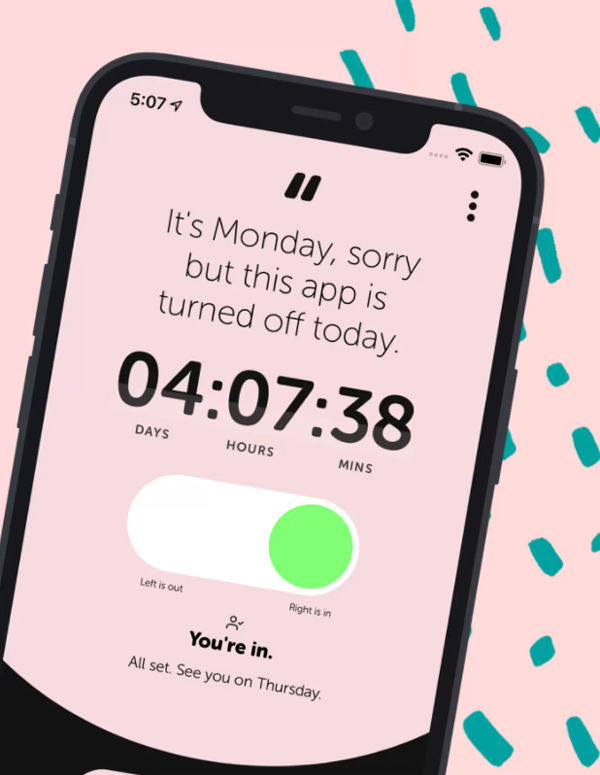‘Thursday’ is the dating app that only works once a week to help reduce dating app fatigue

Remember that text from your latest Tinder match you ‘accidentally’ swiped away from your notification bar this morning? When were you planning on replying to that? Has spontaneity truly become a thing of the past? Maybe the 24/7 accessibility of dating apps is to blame—but imagine having a dedicated day of the week where all of the users you match with on a dating app are available to date. A day filled with adrenaline rushes in sharp contrast to the countless evenings you’ve spent on your couch swiping and scrolling for the sake of it. Meet Thursday, the dating app that comes to life only one day of the week, and like its name suggests, that day is Thursday.

What is Thursday and how does it work?
Thursday is a London-based dating app co-founded by George Rawlings and Matthew McNeill Love with the purpose of nullifying ‘dating app fatigue’. “Getting a match isn’t exciting anymore,” the duo told The Daily Mail. “This is because of the time and effort involved in sparking a decent conversation which actually results in a date.” Outlining how “people are often on different agendas and things fizzle out quickly,” Rawlings and McNeill set out in a bid to change the mindset and motivations backing users in the dating app industry altogether.
“We built an app where everything you want from online dating happens in one day, making Thursday the one day of the week when singles can match, chat and meet.” Why, you ask? Because there’s more to life than dating apps! “By limiting the time the app is on, there will be an atmosphere of proactive dating and an appetite for conversation and dates,” the duo added.
Set to launch in London and New York on 13 May 2021—with subsequent rollouts in Dublin, Cardiff and Glasgow—the app has amassed more than 100,000 sign-ups already. So, if you want to literally turn into a ‘Tinderella’ on Thursdays, here’s how the app is set to work.
After downloading Thursday, users can build their profile by uploading five photos of themselves and sharing their interests and hobbies for others to view and vibe with. They can then send a ‘like’ to someone they fancy. If the like is accepted by the potential match, they can begin chatting. Although potential matches are based on a user’s location, they also have the choice to work out a convenient place to meet up later on the day.
With the potential of matching up to 10 people per day, the app also offers the ‘story’ feature similar to Snapchat. This allows users to share short video clips with their matches. The challenge here, however, is that all of the stories, chats, and matches disappear at midnight every Thursday—so you would have to make the most out of your matches and leave a solid glass slipper in their minds before time runs out.
The app also has a limited number of VIP memberships available for a monthly fee. The profile of these members would be boosted all day and users would be able to send unlimited likes with the potential of unlocking Saturday as a second day they can use the app.
Now, you must be wondering how a dating app can restrict users on specific days. In terms of Thursday’s interface (let’s say if you open up the app on a Monday morning), you would be greeted with a timer counting down the number of days you have to wait until the portal opens up. “It’s Monday, sorry but the app is turned off today” would alternatively be displayed on the top of the screen.
The platform also has a policy against hate speech, including racism, body shaming or misogynistic commentary. Thursday further vows to provide a safe space for women who have lost their confidence among an endless stream of profiles and matches. “We hope women will take comfort in our verification requirement,” the duo told Bustle. “Everyone who uses the app must verify their identity using a government-issued driving license or passport. This means we will know exactly who is using the app at all times.”
Can Thursday really help reduce dating app fatigue though?
Dating app fatigue may sound like a made-up term, but it actually exists along with a list of symptoms to back it up. Also known as ‘swiper’s fatigue’, symptoms of the ‘state of mind’ include a user constantly deleting and reinstalling dating apps on their phones. While deleting the app, users would typically be thinking along the lines of ‘I can find a partner in real life’ whereas, within the next two days, they are seen crawling back into the App Store and reactivating their profile.
There also comes a point where constant swiping on dating apps begins to feel like a chore that they have to do rather than something they want to. Users at this point will constantly open the app without any purpose and swipe right on people they know they’re not interested in—usually with the justification of ‘I need to stop being so picky’. Don’t even get me started on all of the ghosting they would receive. Ghosting is considered equivalent to hitting rock-bottom with dating fatigue.
If that was stressful enough to read, imagine experiencing it in real life. It could actually take a toll on your mental health. A survey conducted on 1,000 dating app users from the UK, commissioned by JigTalk, found that almost 30 per cent of users spend seven hours per week swiping and scrolling to find a match. More worryingly, 14 per cent of those surveyed clocked in a whopping 14 hours. The fatigue is thereby speculated to kill a user’s chance at finding love altogether.
In the case of Thursday, establishing a dedicated day per week would essentially boost the rate at which matches are made, conversations are had and dates are actually organised. “Sure, going on a date that day takes confidence, but the adrenaline and anticipation associated with making Thursdays your day to date—knowing thousands of other people are thinking the same thing—makes this irresistible,” the creators of the app said speaking with Bustle. “It’s all about the fear of missing out and spontaneous dating during our busy lives and it’s bloody refreshing!”
So, if you want to spice up your love life with elements of spontaneity in a digitally-dependant era or feel like pulling through dating app fatigue yourself, it’s not too late to sign up for Thursday before its official launch. All you have to do is head over to the app’s website and register with your email address. You will then be redirected to the app’s private Instagram account where you can request and be notified when the app launches and is ready to be downloaded. Ripping off fairy godmother’s lines from Cinderella, here I am telling you, “Hurry before the clock strikes 12! Because even miracles take a little bit of time.”
@magicfm @ronanofficial heard you speaking about @thursdaydating this morning, do you not know Thursdays are the new Fridays? It’s a great day to date, leaves you the rest of the weekend to catch up with friends and family..
— Jake Mongston (@JJmongston) March 16, 2021




